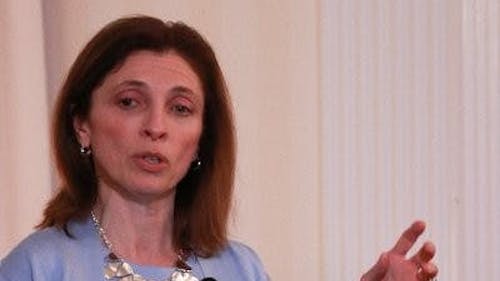Rutgers Eagleton professor discusses midterm election outcomes

More than 46 percent of eligible New Jersey residents voted in last week’s midterm elections.
With help from the Eagleton Institute of Politics, students were prepared and engaged throughout this election season. Elizabeth Matto, an associate research professor and director of Eagleton’s Center for Youth Political Participation, discussed the influences and outcomes of the recent election.
Growing numbers of young adults have expressed themselves politically over the course of the last two years, which led many to predict higher turnouts, Matto said. Predictions were later confirmed by early voting results as 28 states surpassed 2014 midterm election rates, according to The New York Times. This is a phenomenon that Matto described as a victory.
Paula Krysztofik, a School of Environmental and Biological Sciences sophomore, voted for the first time. She said that voting provided her a sense of community and empowerment, allowing her to be a part of a larger movement.
"My first time voting was memorable due to a feeling of independence and making a difference in our community. We are given the right to choose what our futures will hold and make a difference. I will consistently vote every time an election is taking place now," Krysztofik said.
Yet, there are various factors to consider that either enhance or depress the likelihood of someone voting on election day, Matto said.
Registration practices among states play a large role as some, like New Jersey, offer early voting through absentee or mail-in ballots, whereas other states restrict voting to election day, Matto said. Education and income levels have been proven to determine the degree to which one becomes politically mobilized.
Matto said she aspires to encourage and equip young adults to be politically active by providing a mix of scholarship, research, teaching and public service opportunities through the Center for Youth Political Participation. Since 18 to 29 year olds compose a tremendous share of the electorate, she believes that young people can influence change.
Among the center’s numerous events and programs is RU Running, which is a 3-hour workshop that connects students to industry professionals who provide insight on how to run a successful campaign. Eagleton also offers programs such as RU Voting and the Darien Civic Engagement Project, which is open to students of all backgrounds and encourage civic engagement.
Matto also recently taught a Byrne Seminar called "Teaching Politics: Disagreeing Without Being Disagreeable."
She said bridging the partisan divide and fostering conversations are vital for American politics going forward.
"In order for democracy to survive — to thrive — there has to be an ability to engage with people who have different views," Matto said. "We are a nation rooted in liberty ... this conflict is innate. Having those conversations has gotten more and more difficult, and I think in many ways, people who hold different beliefs do not have discussions with the opposing viewpoint or have preconceived notions about someone based on their party affiliation or the news that they watch, or the bumper stickers on their car or who they voted for."



